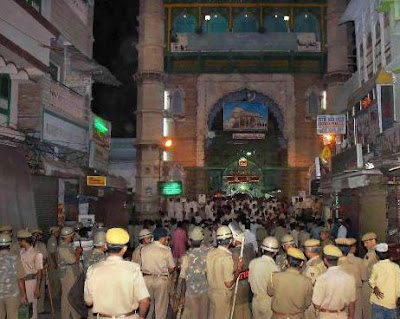When 20 armymen were killed in attack by banned 'militant' groups in Manipur, the TV channels and newspapers termed it as 'ambush'.
Despite the fact that it was the worst attack on army in decades, the word terror wasn't used.
In fact, many reports didn't mention early in their reports, that who was behind the attack.
1. The headlines and sub-headlines were just about 'armymen killed', not about those who committed the act.
2. No one showed photos of wanted NSCN-KCP-KYKL chiefs or security experts talking about their modules or other past crimes by them.
3. For our media, which is quite sensitive about army, this attack was not enough to cause any OUTRAGE.
No live reports, no flash and no special panel discussions. The next morning, newspapers also carried the story just like a routine report, sans any emotion or information about the 'killers'.
4. In follow-up stories in many papers, words like 'rebel' were used, not terrorist or militant. So what exactly is terror?
Does the identity of the 'shooter' or' attackers' lead to sudden decision that word like 'Terrorist' would not be used and it would be termed as 'Ambush'. How this happens, who's behind it?
5. After all in incidents,
when there is no casualty and a person who may not belong to any banned group and is killed in an encounter by police, he is quickly termed terrorist, just for carrying a gun or firing a bullet. Is it because the person has a different name!
6. Let's be straight, it is about having a Muslim name. So how does it occur? Knowingly or Unknowingly. No norms or internal system to decide. Or it is so deeply engrained in minds, that as soon as the report comes or story develops, the differentiation of words is there.
7. Any attack, anywhere [not just in North East, Chhattisgarh or any other part of the country by any banned outfit, howsoever dreaded or big in magnitude, will never be termed Terror attack unless the suspect is a Muslim.
8. If a Muslim is killed in encounter and police says that he was trying to fire, he is termed 'TERRORIST', but those who belong to banned militant-terror groups, and commit such gruesome killings, aren't termed even extremists or radicals.
9. By use of words like 'ambush', the severity of the incident is diluted and the image continues to be reinforced that Terrorist can only be a CERTAIN PERSON, belonging to a certain group. Isn't it absolutely unfair and unjustified.
10. Religious is a factor. There is a clear bias. Let's face it. A non-Muslim can commit crime of any magnitude but won't be termed as Terrorist. And a Muslim can always be implicated and termed Terrorist even if he hasn't commit any violent act.
If youths who shot a Delhi cop who had raided their home in Batla House locality were termed terrorists by all, then why those who killed 20 armymen NOT called terrorist? Define terrorism or accept your biases and double standards. Accept, that you are not naive, but doing it purposely to defame Muslims. That it's Islamophobia--crime to malign an entire religion.
11. The result is that in a country where
Armyman is treated in utmost respect and injury or casualty can lead to media affecting relations with other countries, the terrorist attacks like in Manipur, are simply treated as 'just an unfortunate happening' and is forgotten.
12. On the contrary, individuals can be framed, termed 'Terrorist' without even firing a bullet, and made to rot in jails for the rest of their lives, because if someone is termed Terrorist, everyone parrots the line, he is branded and he is destroyed--from lawmakers to courts, he is seen as one.
So does anyone has answer that why such unfair attitude in media persists.
Aren't Muslims justified in feeling that they are being targeted and wrongly portrayed. Why it continues? Is it because there is no strong voice raised till now by Muslim leaders, politicians, thinkers and community jointly?






























